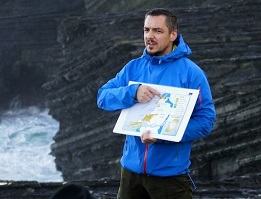Dr Simon Barker, Principal Geologist at Equinor, Bergen, Norway, and PhD graduate of UCD’s School of Earth Sciences, talks to us about geoscientists’ role in the energy transition and reminisces about his time in UCD.

How important is subsurface understanding and modelling for the energy transition?
An ideal model is to see the major energy companies progressively shift toward carbon neutrality and even deficit, whilst still providing society the energy and products needed via safe, efficient and profitable operations. The exploitation of mineral resources will therefore continue, but potentially at reduced levels of activity over the coming years. We also see the first promising vestiges of carbon sequestration as a business and the need for subsurface models of porosity, permeability, lithological layering, geobodies ID, paleaogeography, tectonics and structural set-up, the reservoir, the trap, the seal and so on. In addition, the traditional ‘oil company’ is becoming more open to diversification to other business areas such as metal and minerals extraction, traditionally seen as ‘mining’, as these materials become more important in the energy transition mix. An advantage here is to capitalize on the existing geoscience core competences that exist within these companies. Whilst the picture is more uncertain that it has perhaps ever been for the industry, it is hard to see a future without geoscience remaining a key discipline.
What was your experience of doing a PhD in the UCD School of Earth Sciences?
UCD, Dublin and the School provided me with one of my most enjoyable and fulfilling phases of life experience, not just a route for continuing education. The PhD experience was highly sociable with great atmosphere and camaraderie. This was not just on a Friday evening, but everyday conversations around the long table of the coffee room and on the football pitch for our Tuesday and Thursday kick arounds, involving a mix of PhDs, Post-Docs, Professors and undergrads. I genuinely miss my time there. The global exposure and impact of the various research groups and Professors meant access as a PhD to an excellent global network of academia and industry, options for funding and facilities, and of course, attending some of the top conferences. I would not hesitate to recommend UCD as a great place to study geosciences.
Why is it important for geoscientists to understand the subsurface?
Geoscience theory is only part of the story when it comes to subsurface application. A key consideration in the subsurface is interpretational uncertainty when applying theory with the aim of making predictions. Acknowledging uncertainty is an inescapable reality forced by the scale of financial investment proposals. Understanding how uncertainty is generated and the pitfalls of imperfect data and theory makes us better geoscientists, more open to ranges of possibilities. It is this uncertainty that means that the human geoscientist will not be replaceable by technology any time soon. The subsurface has also been a key laboratory and technology driver that has fed understanding back to advance the science. From a commercial exploitation perspective, energy and materials sourced in the subsurface continue to underpin how our societies function, and despite the growing focus on the consequences, geoscientists will be needed to analyse the subsurface during the energy transition and beyond.
How important are digital skills for a career in applied geoscience?
‘Digital skills’ refers to a broad range of skillsets. It would be a great advantage to be an expert data scientist and coder, and to have deep domain skills in geoscience. But we can do a lot with a little bit of digital knowledge. For some decades, there has been a need for applied geoscientists to get to grips with a large range of complex software, from subsurface interpretation and modelling packages, to statistical scenario modelling tools. Even the basic Office software becomes an essential part of the digital skillset as nothing is achieved without good communication. The most important factor is to be open-minded and curious about new approaches and ways of integrating data that digitalization can offer. You can always ask your local data scientist to assist with the heavy lifting when it comes to data issues and analytics (data scientists have become a very visible new discipline in the industry in a short period of time – another educational route in therefore). For the geoscientist, data analytics is simply another tool to be used with creativity for enhancing subsurface prediction.